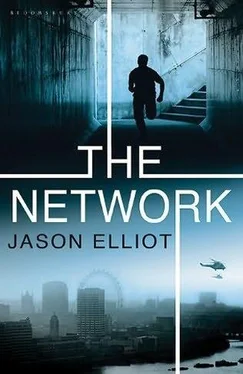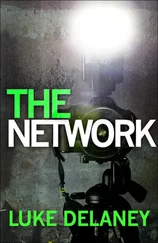Jason Elliot - The Network
Здесь есть возможность читать онлайн «Jason Elliot - The Network» весь текст электронной книги совершенно бесплатно (целиком полную версию без сокращений). В некоторых случаях можно слушать аудио, скачать через торрент в формате fb2 и присутствует краткое содержание. Жанр: Триллер, на английском языке. Описание произведения, (предисловие) а так же отзывы посетителей доступны на портале библиотеки ЛибКат.
- Название:The Network
- Автор:
- Жанр:
- Год:неизвестен
- ISBN:нет данных
- Рейтинг книги:4 / 5. Голосов: 1
-
Избранное:Добавить в избранное
- Отзывы:
-
Ваша оценка:
- 80
- 1
- 2
- 3
- 4
- 5
The Network: краткое содержание, описание и аннотация
Предлагаем к чтению аннотацию, описание, краткое содержание или предисловие (зависит от того, что написал сам автор книги «The Network»). Если вы не нашли необходимую информацию о книге — напишите в комментариях, мы постараемся отыскать её.
The Network — читать онлайн бесплатно полную книгу (весь текст) целиком
Ниже представлен текст книги, разбитый по страницам. Система сохранения места последней прочитанной страницы, позволяет с удобством читать онлайн бесплатно книгу «The Network», без необходимости каждый раз заново искать на чём Вы остановились. Поставьте закладку, и сможете в любой момент перейти на страницу, на которой закончили чтение.
Интервал:
Закладка:
It’s only lunchtime, but already the day seems long. I head home, briefly entertaining the fantasy that as I turn into my drive I’ll see a red Alfa Romeo parked there, and the beautiful Ziyba will be waiting for me nearby.
I don’t, and she isn’t.
4
In the course of the following week I make two journeys. The first needs an accomplice. An old friend in London is happy to oblige. We’ve long ago agreed on an innocuous code word signifying alarm that can be slipped into a telephone conversation, so his suggestion that we have dinner together in London that evening sounds spontaneous enough to anyone who might be listening. It also allows me to name the restaurant, the location of which means I can walk credibly past a certain street corner in Maida Vale and, in the act of posting a letter, leave a chalk mark for an elderly lady to see on her daily walk the following morning. It’s old-fashioned, but it works, and allows me to avoid making a phone call which Seethrough’s minions are no doubt already authorised to intercept.
Halfway along Pall Mall, and sandwiched between what its occupants consider to be lesser places, stands a stone building said to be inspired by Michelangelo’s Palazzo Farnese in Rome. Nine steps lead up to dark heavy doors. It’s late morning. I check the time and walk up into the imposing entrance, where the porter, as porters are wont to do in such establishments, looks me up and down with a dour expression of enquiry.
‘Baroness K- is expecting me in the library,’ I say.
He glances down at the papers on the kiosk counter and looks up again with a marginally more friendly expression.
‘Very good, sir.’
I walk up the second set of steps into the flamboyant atrium. Glancing overhead I can see the graceful arcs of lead-crystal lozenges in the roof and the dark and slender Ionic columns of the upper gallery. I turn left towards the stairs, passing beneath the grand oil paintings on the walls and the marble facings in deep red and green, until I reach the cavernous opulence of the library. After the rush of traffic on the street below, the long room seems magically quiet. A few members glance discreetly up through the ritual dimness at the entry of a stranger, then return to their subdued conversations.
At the eastern end of the room stands the woman I’ve come to see, studying the spines of a row of leather-bound volumes beside the bay of a tall window. She turns and peers over her glasses just as I enter, and steps forward to meet me.
‘My dear boy,’ she says as we embrace. ‘You look more like your father every time I see you.’ And you, I think to myself, look older. It’s only been a month since our last meeting, but the radiotherapy has taken its toll on her body. She’s grown noticeably thinner, and there’s a visible space between the collar of her black cashmere sweater and the sinews of her neck. There’s a growing stoop to her bird-like frame, the bones of which seem too narrow and fragile to contain the sum of her life’s experience. Yet her movements are nimble and precise, and her voice is still charged with the quiet authority and confidence of an adviser to ministers and confidante to heads of state, and of her lifetime calling of scholar and spy. She ushers me to a marble fireplace and her voice lowers as we settle into a pair of red leather armchairs beneath a worn and austere-looking marble bust of Milton.
‘Your signal was awfully faint; I wasn’t sure if it was you. Or perhaps it’s my glasses. I lose them so often nowadays.’
‘They don’t make chalk like they used to,’ I suggest.
She presses a discreet button by the fireplace. A waiter appears a few moments later and she orders her usual, a whisky and soda with no ice. I ask for the same.
‘You’re well,’ I say.
‘Eighty-seven isn’t a bad innings, if you think about it. I do have trouble with opening things, which is the worst aspect of getting old, but other than that everything seems to be working.’ A gentle smile comes over her gaunt features. ‘You must enjoy your youth while you have it. Did I tell you the president of Naronda offered me a state funeral? I don’t suppose one can take him up on it. He was a child when we all had to leave but it seems he never forgot the constitution I drafted rather in his favour.’
‘I trust you’ll keep him waiting,’ I said.
We chat for a while and, postponing the inevitable, catch up on personal news. Then she puts her glass gently onto the small table between us. Her cheeks and the skin beneath her eyes droop noticeably downwards and give her a bloodhound’s perpetually sad look of enquiry. But the clear grey steely quality of her gaze remains unchanged, and now her eyes fall undistractedly on me.
‘But we have more important things to talk about. Tell me.’
I tell every detail of my encounter with Seethrough, the operation he’s proposed and the decision I’ll soon be forced to make. The Baroness listens intently, and when I’ve told her everything, she nods gravely and gazes towards the window, reciting in a quiet voice,
‘Macavity, Macavity, there’s no one like Macavity,
There never was a Cat of such deceitfulness and suavity.’
‘Your memory always astonishes me,’ I say.
‘In our day your father and I had to memorise everything before a mission. He had the advantage of perfect French – not like me. I shall never forget the occasion when he asked a German soldier for directions. We were somewhere in the Vosges. The soldier was perfectly civil, but of course he didn’t know our guns were pointed at him in our pockets. If he’d spoken to me, we would’ve had it. I came from Section D and I don’t suppose my Arabic would have got us very far.’
‘Section D?’
‘Did I say that? It’s such a long time ago now. I don’t suppose St Ermin’s even exists any longer. But your father was a brave man. And a patriot, though he would never admit it. After the Blitz his attitude towards the Germans changed. I don’t suppose he ever forgave them, but he never let revenge get in the way. You must above all do the same.’
‘I haven’t given it much thought,’ I say, which is untrue.
‘But you must be prepared. Perhaps you know the story of Ali and the knight? Rumi tells it in the Mathnawi.’
I haven’t heard it, though I know of the reverence in which the famous poet is held in the Persian-speaking world. It’s an odd moment to be recounting an eastern fable, but the Baroness always has her reasons.
‘I’ll tell you, but then we must have some lunch.’ She studies the backs of her hands thoughtfully for a moment, then clasps them neatly together and lets them come to rest on her lap.
‘You know that the fourth caliph, Ali, was said to have been a courageous fighter as well as a political leader – not like today’s, I need hardly say,’ she snorts. ‘Well. Ali is on the battlefield and engages a Christian knight. They fight, and the Christian falls to the ground. Ali is about to kill him when the knight, in a final act of defiance, spits in his face. But instead of lopping off his head, Ali sheathes his sword, and lets the knight go free. Now, the knight is a bit surprised by this and asks why on earth he didn’t kill him when he had the chance. “Because if I’d killed you at that moment,” says the great warrior, “it would have been from anger, and against the principles of war.” The knight is so impressed he converts to Islam. It’s a good story, and of course the Shi’a love it.’ The Baroness sighs. ‘The man who strives for freedom doesn’t allow himself to be provoked, even in the heat of battle. At least that’s how I understand it. Freedom. You must strive for the same thing.’ She pauses. ‘Things will happen quickly now that they’ve found a role for you. It suits our purpose, and you must play the part.’
Читать дальшеИнтервал:
Закладка:
Похожие книги на «The Network»
Представляем Вашему вниманию похожие книги на «The Network» списком для выбора. Мы отобрали схожую по названию и смыслу литературу в надежде предоставить читателям больше вариантов отыскать новые, интересные, ещё непрочитанные произведения.
Обсуждение, отзывы о книге «The Network» и просто собственные мнения читателей. Оставьте ваши комментарии, напишите, что Вы думаете о произведении, его смысле или главных героях. Укажите что конкретно понравилось, а что нет, и почему Вы так считаете.












